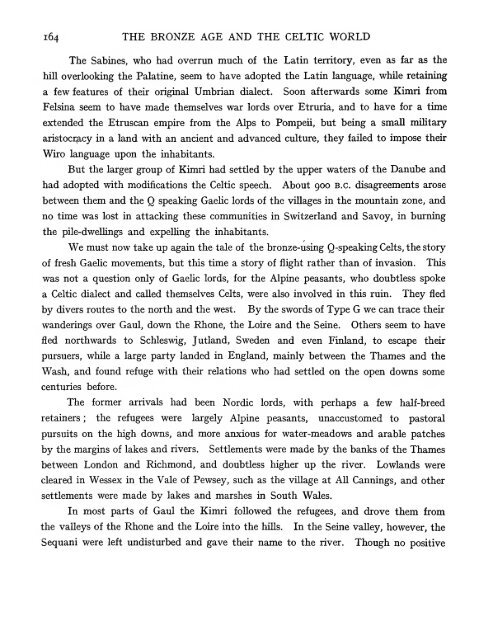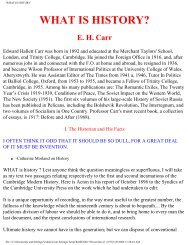The bronze age and the Celtic world - Universal History Library
The bronze age and the Celtic world - Universal History Library
The bronze age and the Celtic world - Universal History Library
You also want an ePaper? Increase the reach of your titles
YUMPU automatically turns print PDFs into web optimized ePapers that Google loves.
i64 THE BRONZE AGE AND THE CELTIC WORLD<br />
<strong>The</strong> Sabines, who had overrun much of <strong>the</strong> Latin territory, even as far as <strong>the</strong><br />
hill overlooking <strong>the</strong> Palatine, seem to have adopted <strong>the</strong> Latin langu<strong>age</strong>, while retaining<br />
a few features of <strong>the</strong>ir original Umbrian dialect. Soon afterwards some Kimri from<br />
Felsina seem to have made <strong>the</strong>mselves war lords over Etruria, <strong>and</strong> to have for a time<br />
extended <strong>the</strong> Etruscan empire from <strong>the</strong> Alps to Pompeii, but being a small military<br />
aristocracy in a l<strong>and</strong> with an ancient <strong>and</strong> advanced culture, <strong>the</strong>y failed to impose <strong>the</strong>ir<br />
Wiro langu<strong>age</strong> upon <strong>the</strong> inhabitants.<br />
But <strong>the</strong> larger group of Kimri had settled by <strong>the</strong> upper waters of <strong>the</strong> Danube <strong>and</strong><br />
had adopted with modifications <strong>the</strong> <strong>Celtic</strong> speech. About 900 B.C. disagreements arose<br />
between <strong>the</strong>m <strong>and</strong> <strong>the</strong> Q speaking Gaelic lords of <strong>the</strong> vill<strong>age</strong>s in <strong>the</strong> mountain zone, <strong>and</strong><br />
no time was lost in attacking <strong>the</strong>se communities in Switzerl<strong>and</strong> <strong>and</strong> Savoy, in burning<br />
<strong>the</strong> pile-dwellings <strong>and</strong> expelling <strong>the</strong> inhabitants.<br />
We must now take up again <strong>the</strong> tale of <strong>the</strong> <strong>bronze</strong>-using Q-speaking Celts, <strong>the</strong> story<br />
of fresh Gaelic movements, but this time a story of flight ra<strong>the</strong>r than of invasion. This<br />
was not a question only of Gaelic lords, for <strong>the</strong> Alpine peasants, who doubtless spoke<br />
a <strong>Celtic</strong> dialect <strong>and</strong> called <strong>the</strong>mselves Celts, were also involved in this ruin. <strong>The</strong>y fled<br />
by divers routes to <strong>the</strong> north <strong>and</strong> <strong>the</strong> west. By <strong>the</strong> swords of Type G we can trace <strong>the</strong>ir<br />
w<strong>and</strong>erings over Gaul, down <strong>the</strong> Rhone, <strong>the</strong> Loire <strong>and</strong> <strong>the</strong> Seine. O<strong>the</strong>rs seem to have<br />
fled northwards to Schleswig, Jutl<strong>and</strong>, Sweden <strong>and</strong> even Finl<strong>and</strong>, to escape <strong>the</strong>ir<br />
pursuers, while a large party l<strong>and</strong>ed in Engl<strong>and</strong>, mainly between <strong>the</strong> Thames <strong>and</strong> <strong>the</strong><br />
Wash, <strong>and</strong> found refuge with <strong>the</strong>ir relations who had settled on <strong>the</strong> open downs some<br />
centuries before.<br />
<strong>The</strong> former arrivals had been Nordic lords, with perhaps a few half-breed<br />
retainers ; <strong>the</strong> refugees were largely Alpine peasants, unaccustomed to pastoral<br />
pursuits on <strong>the</strong> high downs, <strong>and</strong> more anxious for water-meadows <strong>and</strong> arable patches<br />
by <strong>the</strong> margins of lakes <strong>and</strong> rivers. Settlements were made by <strong>the</strong> banks of <strong>the</strong> Thames<br />
between London <strong>and</strong> Richmond, <strong>and</strong> doubtless higher up <strong>the</strong> river. Lowl<strong>and</strong>s were<br />
cleared in Wessex in <strong>the</strong> Vale of Pewsey, such as <strong>the</strong> vill<strong>age</strong> at All Cannings, <strong>and</strong> o<strong>the</strong>r<br />
settlements were made by lakes <strong>and</strong> marshes in South Wales.<br />
In most parts of Gaul <strong>the</strong> Kimri followed <strong>the</strong> refugees, <strong>and</strong> drove <strong>the</strong>m from<br />
<strong>the</strong> valleys of <strong>the</strong> Rhone <strong>and</strong> <strong>the</strong> Loire into <strong>the</strong> hills. In <strong>the</strong> Seine vaUey, however, <strong>the</strong><br />
Sequani were left undisturbed <strong>and</strong> gave <strong>the</strong>ir name to <strong>the</strong> river. Though no positive







